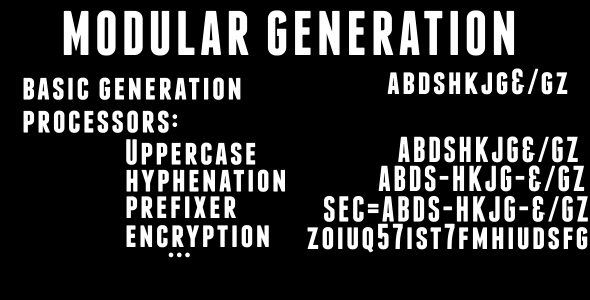Keygen Php Maker Template
PHPMaker 2018 Crack With Serial Key Full Final Download
PhPMaker 2018 Crack a sophisticated PHP generator that gives an effective. Also Flexible and automation tool for growing websites with PHP constructed into shape and database. It brings necessary changes from the preceding model. So Including a brand new list web page, a new quicker script engine, and so forth. So Phpmaker keygen Full version of Windows XP, 8, 8.1. One of the maximum crucial tools for internet site designers.
PHPMaker 2018 Crack gives the perfect strategy to create a database pushed website. It comes with an intuitive interface, smooth-to-use, very flexible, may be customized in step with the wishes, numerous alternatives, and quick route. Make all and sundry can construct an expert and cozy website smoothly and quick.
Buy API Key Generator by Sourcegeek on CodeCanyon. This is a PHP5 class that will allow you to generate a key for an especific user and validate it. In the features, th.
PHPMaker 2018 Serial Key
UUPGM-TAM4C-C4SCM-CCFJA-Y8R37
ZER4W-7SDC5-C42CC-DMTMJ-M647C
CCC5C-6HCZE-RT4AM-XCM5S-AR3FE
YNT5Y-85K5C-4KQAC-CC5ZN-6AEA4
Key Features:
- Simple, intuitive, and clean-to-use
- Synchronizing undertaking with database
- Supports MySQL, Access, and Oracle, and so forth.
- Supports multiple detail tables
- Support report importing to the database
- Upload file to database or folder
- Table-precise listing page options
- Linked tables from a couple of databases
- Fully customizable view and edit options
- Export database to any codecs
- Customizable template and UI
- Export databases/tables to the printer
- Custom view barcode and QR code
- Create PHP apps with Responsive Layout
- Complete person registration system
- Breadcrumbs, vector icons, and tooltip
- Advanced database security, and lots of extras.
Keygen Php Maker Template Free
What’s new in PHPMaker 2017:
- tables without number one key
- New modal view and list web page
- New locale files and settings
- Windows/LDAP authentication
- New field visibility extension
- New quicker script technology
- faster loading & unloading
- New dialog to the research table
- Other bug fixes and enhancements
I'm trying to create a randomized string in PHP, and I get absolutely no output with this:
What am I doing wrong?
Peter Mortensen53 Answers
To answer this question specifically, two problems:
$randstringis not in scope when you echo it.- The characters are not getting concatenated together in the loop.
Here's a code snippet with the corrections:
Output the random string with the call below:
Please note that this generates predictable random strings. If you want to create secure tokens, see this answer.
steadwebNote: str_shuffle() internally uses rand(), which is unsuitable for cryptography purposes (e.g. generating random passwords). You want a secure random number generator instead. It also doesn't allow characters to repeat.
UPDATED(now this generates any length of string):
That's it. :)
There are a lot of answers to this question, but none of them leverage a Cryptographically Secure Pseudo-Random Number Generator (CSPRNG).
The simple, secure, and correct answer is to use RandomLib and don't reinvent the wheel.
For those of you who insist on inventing your own solution, PHP 7.0.0 will provide random_int() for this purpose; if you're still on PHP 5.x, we wrote a PHP 5 polyfill for random_int() so you can use the new API even before you upgrade to PHP 7.
Safely generating random integers in PHP isn't a trivial task. You should always check with your resident StackExchange cryptography experts before you deploy a home-grown algorithm in production.

With a secure integer generator in place, generating a random string with a CSPRNG is a walk in the park. 6 3 keygen qnx operating.
Creating a Secure, Random String
Usage:
Demo: https://3v4l.org/IMJGF (Ignore the PHP 5 failures; it needs random_compat)
Scott ArciszewskiScott ArciszewskiThis creates a 20 character long hexadecimal string:
In PHP 7 (random_bytes()):
Peter Mortensen@tasmaniski: your answer worked for me. I had the same problem, and I would suggest it for those who are ever looking for the same answer. Here it is from @tasmaniski:
Here is a youtube video showing us how to create a random number
HumphreyHumphreyDepending on your application (I wanted to generate passwords), you could use
Being base64, they may contain = or - as well as the requested characters. You could generate a longer string, then filter and trim it to remove those.
openssl_random_pseudo_bytes seems to be the recommended way way to generate a proper random number in php. Why rand doesn't use /dev/random I don't know.
Here is a simple one-liner that generates a true random string without any script level looping or use of OpenSSL libraries.
To break it down so the parameters are clear
This method works by randomly repeating the character list, then shuffles the combined string, and returns the number of characters specified.
You can further randomize this, by randomizing the length of the returned string, replacing $chrRandomLength with mt_rand(8, 15) (for a random string between 8 and 15 characters).
A better way to implement this function is:
mt_rand is more random according to this and this in PHP 7. The rand function is an alias of mt_rand.
 Peter Mortensen
Peter Mortensen$randstring in the function scope is not the same as the scope where you call it. You have to assign the return value to a variable.
Or just directly echo the return value:
Also, in your function you have a little mistake. Within the for loop, you need to use .= so each character gets appended to the string. By using = you are overwriting it with each new character instead of appending.
First, you define the alphabet you want to use:
Then, use openssl_random_pseudo_bytes() to generate proper random data:
Finally, you use this random data to create the password. Because each character in $random can be chr(0) until chr(255), the code uses the remainder after division of its ordinal value with $alphabet_length to make sure only characters from the alphabet are picked (note that doing so biases the randomness):
Alternatively, and generally better, is to use RandomLib and SecurityLib:
Here are some shortest method to generate the random string
Punit GajjarPunit GajjarI've tested performance of most popular functions there, the time which is needed to generate 1'000'000 strings of 32 symbols on my box is:
Please note it is not important how long it really was but which is slower and which one is faster so you can select according to your requirements including cryptography-readiness etc.
substr() around MD5 was added for sake of accuracy if you need string which is shorter than 32 symbols.
For sake of answer: the string was not concatenated but overwritten and result of the function was not stored.
PutnikPutnikThis one was taken from adminer sources:
Adminer, database management tool written in PHP.
userlonduserlondOne very quick way is to do something like:
This will generate a random string with the length of 10 chars. Of course, some might say it's a bit more heavy on the computation side, but nowadays processors are optimized to run md5 or sha256 algorithm very quickly. And of course, if the rand() function returns the same value, the result will be the same, having a 1 / 32767 chance of being the same. If security's the issue, then just change rand() to mt_rand()
Source from http://www.xeweb.net/2011/02/11/generate-a-random-string-a-z-0-9-in-php/
mike_tThe edited version of the function works fine, but there is just one issue I found: You used the wrong character to enclose $characters, so the ’ character is sometimes part of the random string that is generated.
To fix this, change:
to:
This way only the enclosed characters are used, and the ’ character will never be a part of the random string that is generated.
Peter MortensenAnother one-liner, which generates a random string of 10 characters with letters and numbers. It will create an array with range (adjust the second parameter to set the size), loops over this array and assigns a random ASCII character (range 0-9 or a-z), then implodes the array to get a string.
Note: this only works in PHP 5.3 and later
Peter MortensenOne liner.
It is fast for huge strings with some uniqueness.
Peter MortensenI liked the last comment which used openssl_random_pseudo_bytes, but it wasn't a solution for me as I still had to remove the characters I didn't want, and I wasn't able to get a set length string. Here is my solution..
Another way to generate a random string in PHP is:
Peter MortensenParametrised one-liner using only PHP native functions, working since PHP 5.1.0
user10099user10099Keygen Php Maker Template Word
There is simple code:
There is a simple guide:
- To change the length of string, please change the
16to another value, only. - To select from different characters, please change the character string.
Finally I have found a solution to get random and unique values.
My solution is:
time always return a timestamp, and it is always unique. You can use it with MD5 to make it better.
There are better alternatives to this. Many was already posted so I give you only your stuff back with fixes:
Also you may be interested in:
Or another one:
Peter MortensenFree Template Maker Download
Geoprotected by animuson♦Jul 17 '13 at 22:51
Thank you for your interest in this question. Because it has attracted low-quality or spam answers that had to be removed, posting an answer now requires 10 reputation on this site (the association bonus does not count).
Would you like to answer one of these unanswered questions instead?